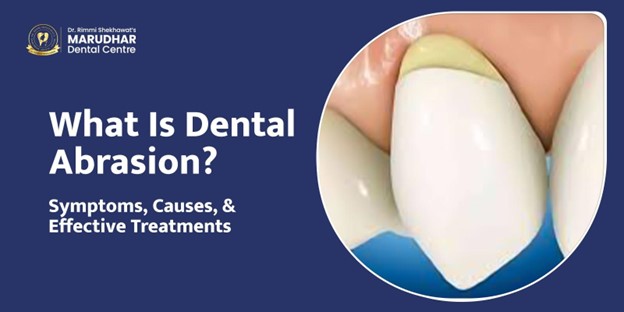It's important to practice good oral hygiene, but did you realize that improper brushing might harm your teeth? Dental abrasion is one such issue brought on by bad brushing and other regular routines. It's more prevalent than you might imagine, and if you ignore it, it can cause long-term harm, sensitivity, and degradation.
In this guide, we’ll break down everything you need to know about dental abrasion — including its symptoms, causes, and most effective treatments. If you're seeking advice from the best dentist in Jaipur, you're already taking the right step toward protecting your enamel and long-term dental health.
What is Dental Abrasion?
The progressive loss of tooth enamel, or the hard outer coating of your teeth, due to mechanical wear rather than bacteria or acid, as in tooth decay, is known as dental abrasion. Usually, it manifests as worn-out patches, grooves, or notches close to the gum line.
Although these damaged areas might not pain right away, the loss of enamel over time can cause cavities, exposed roots, and dental sensitivity. Visiting the best dental clinic in Jaipur can help diagnose and treat these issues early with personalized care.
Common Symptoms of Dental Abrasion
You may be unaware that you have a dental abrasion. The following are important indicators to look for:
- Grooves or notches close to the gum line
- heightened sensitivity of the teeth, particularly to cold or sweet foods
- Because of the exposed dentin, it appears yellow.
- A tooth surface that is rough or shows obvious enamel deterioration
- Gum recession or discomfort close to teeth that are affected
If you notice any of these symptoms, it’s best to consult your dentist early to prevent further damage.
What Causes Dental Abrasion?
Prevention requires a thorough understanding of the underlying problem. The following are the primary causes of dental abrasions:
1. Forceful Brushing
Over time, using a toothbrush with strong bristles or applying excessive pressure might remove your enamel.
2. Ineffective Brushing Method
Wear and tear is increased when brushing in a horizontal manner as opposed to soft circular strokes.
3. Toothpaste with abrasives
Too abrasive for daily use, some whitening or charcoal-based toothpastes might damage enamel.
4. Using Hard Objects or Toothpicks
Using sharp things to repeatedly poke your teeth or gums can cause enamel to get scraped and damaged.
5. Chewing pens or biting nails
These behaviors gradually erode the surfaces of your teeth in addition to affecting your jaw.
How is Dental Abrasion Diagnosed?
Dental abrasions can be identified by a dentist visually inspecting the worn regions.
- Tactile probing for sensitivity and depth
- X-rays to evaluate underlying damage (in extreme situations)
- Using the patient's history, determine which habits are creating the issue.
- A timely diagnosis aids in halting the development and averting more severe oral health problems.
Treatment Options for Dental Abrasion
Treatment depends on the severity of enamel loss. Here’s what your dentist might suggest:
1. Use of Fluoride
Fluoride gels or varnishes can lessen sensitivity and strengthen enamel in mild cases.
2. Agents that desensitize
Pain from exposed dentin can be lessened with the use of special toothpaste or gels.
3. Fillings or Dental Bonding
teeth-colored filling material is utilized to restore the damaged structure and shield the teeth in moderate to severe abrasions.
4. Personalized Mouth Guards
A guard helps prevent additional wear if bad habits like grinding or biting the nails are the problem.
5. Guidance on Behavior
In addition to recommending soft-bristled brushes and non-abrasive toothpaste, dentists frequently assist patients in changing their brushing habits.
How to Prevent Dental Abrasion
Prevention is always better than cure. Here’s how to keep your enamel safe:
- Use a soft-bristled toothbrush
- Brush gently in circular motions, not back and forth
- Switch to low-abrasive toothpaste Avoid using teeth to open packages or bite hard objects
- Visit your dentist regularly for early detection
When to See a Dentist
If you notice notches on your teeth, sudden sensitivity, or gum recession, don’t ignore it. A dental consultation can prevent minor abrasion from turning into a painful dental issue.
Final Thoughts
Dental abrasion may seem minor at first, but it can lead to long-term complications if left untreated. With the right brushing technique, better oral care products, and early intervention, you can protect your teeth from unnecessary wear. Regular checkups with your dentist will ensure that your enamel stays strong and healthy for years to come.






